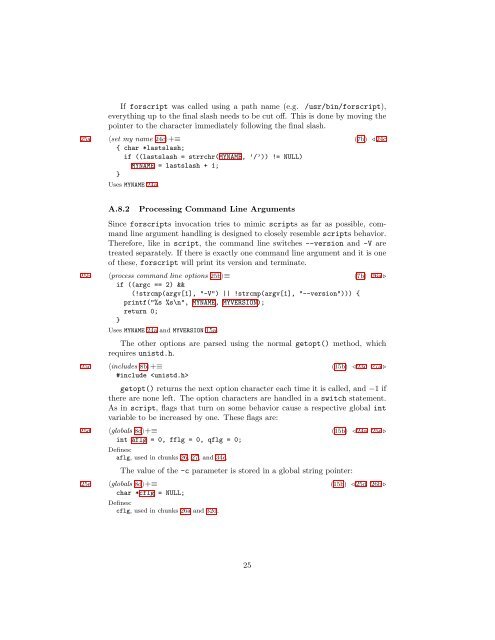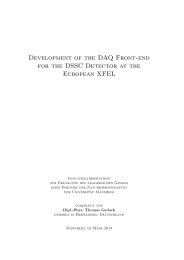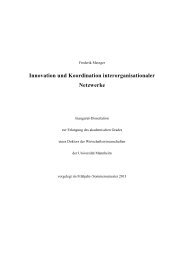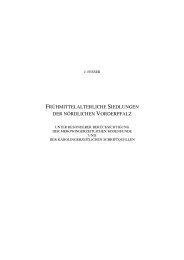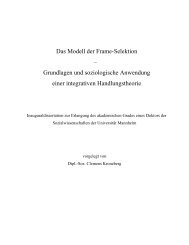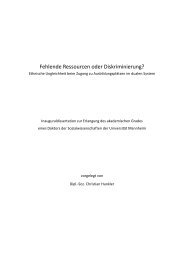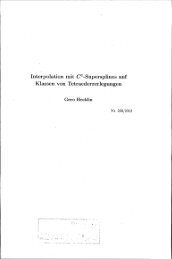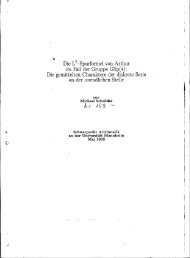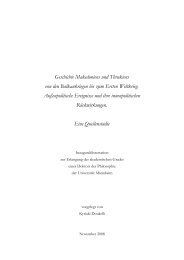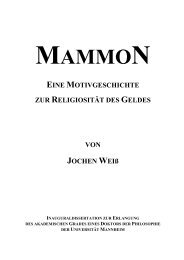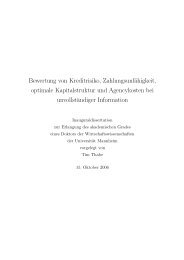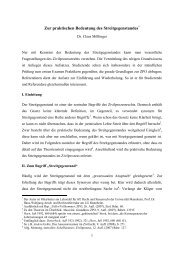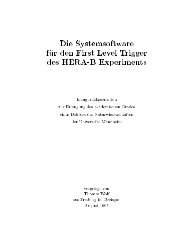Design and Implementation of a Documentation Tool for ... - MADOC
Design and Implementation of a Documentation Tool for ... - MADOC
Design and Implementation of a Documentation Tool for ... - MADOC
Create successful ePaper yourself
Turn your PDF publications into a flip-book with our unique Google optimized e-Paper software.
If <strong>for</strong>script was called using a path name (e.g. /usr/bin/<strong>for</strong>script),<br />
everything up to the final slash needs to be cut <strong>of</strong>f. This is done by moving the<br />
pointer to the character immediately following the final slash.<br />
25a 〈set my name 24c〉+≡ (7b) ⊳ 24c<br />
{ char *lastslash;<br />
if ((lastslash = strrchr(MYNAME, ’/’)) != NULL)<br />
MYNAME = lastslash + 1;<br />
}<br />
Uses MYNAME 24a.<br />
A.8.2 Processing Comm<strong>and</strong> Line Arguments<br />
Since <strong>for</strong>scripts invocation tries to mimic scripts as far as possible, comm<strong>and</strong><br />
line argument h<strong>and</strong>ling is designed to closely resemble scripts behavior.<br />
There<strong>for</strong>e, like in script, the comm<strong>and</strong> line switches --version <strong>and</strong> -V are<br />
treated separately. If there is exactly one comm<strong>and</strong> line argument <strong>and</strong> it is one<br />
<strong>of</strong> these, <strong>for</strong>script will print its version <strong>and</strong> terminate.<br />
25b 〈process comm<strong>and</strong> line options 25b〉≡ (7b) 26a ⊲<br />
if ((argc == 2) &&<br />
(!strcmp(argv[1], "-V") || !strcmp(argv[1], "--version"))) {<br />
printf("%s %s\n", MYNAME, MYVERSION);<br />
return 0;<br />
}<br />
Uses MYNAME 24a <strong>and</strong> MYVERSION 15a.<br />
The other options are parsed using the normal getopt() method, which<br />
requires unistd.h.<br />
25c 〈includes 8b〉+≡ (15b) ⊳ 23c 27a ⊲<br />
#include <br />
getopt() returns the next option character each time it is called, <strong>and</strong> −1 if<br />
there are none left. The option characters are h<strong>and</strong>led in a switch statement.<br />
As in script, flags that turn on some behavior cause a respective global int<br />
variable to be increased by one. These flags are:<br />
25d 〈globals 8d〉+≡ (15b) ⊳ 24a 25e ⊲<br />
int aflg = 0, fflg = 0, qflg = 0;<br />
Defines:<br />
aflg, used in chunks 26, 27, <strong>and</strong> 34c.<br />
The value <strong>of</strong> the -c parameter is stored in a global string pointer:<br />
25e 〈globals 8d〉+≡ (15b) ⊳ 25d 26b ⊲<br />
char *cflg = NULL;<br />
Defines:<br />
cflg, used in chunks 26a <strong>and</strong> 32d.<br />
25


